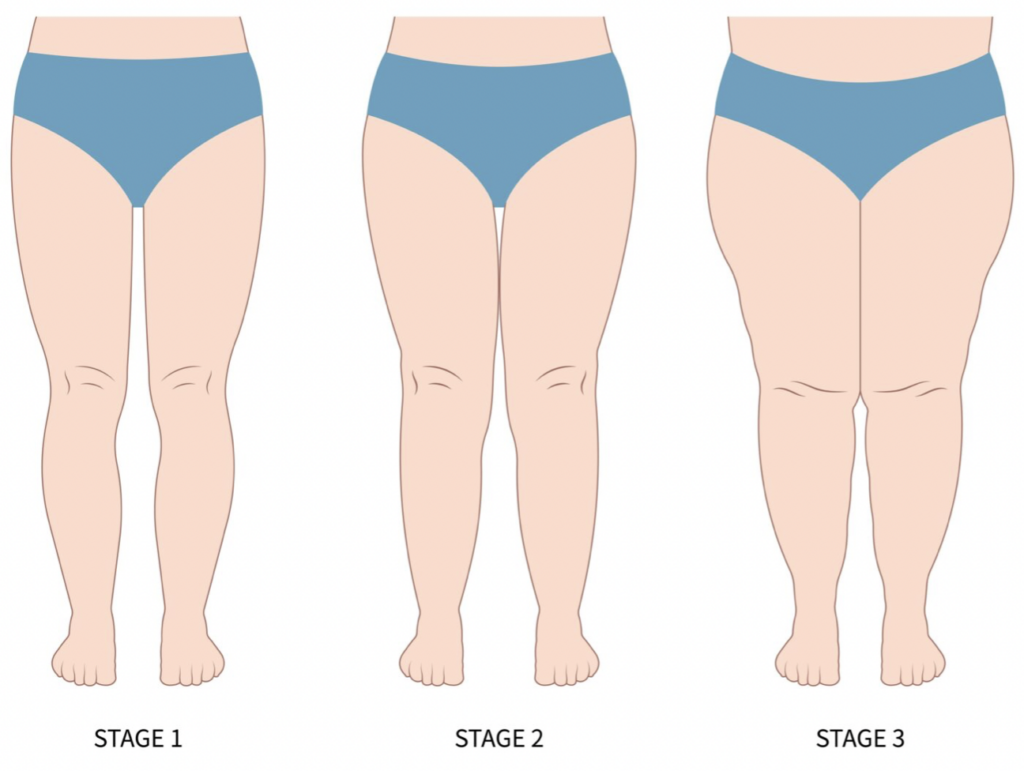Lipedema, a chronic condition often mistaken for obesity or Lymphedema, involves the symmetrical buildup of fat cells in specific areas of the body, primarily the legs and arms.
It predominantly affects women and can lead to significant physical and emotional impact. One of the common concerns among women diagnosed with Lipedema is whether the condition worsens over time. Let’s delve into the progression of Lipedema, factors that may exacerbate it and strategies to manage its symptoms effectively.
What is Lipedema?
Before covering the progression of Lipedema, it’s vital to understand what Lipedema is. Lipedema causes the accumulation of lymphatic fluid in certain areas of the body which eventually converts into fat deposits, typically from the hips to the ankles, sparing the feet.
The skin may be tender and bruise easily and the condition often comes with pain and discomfort. Lipedema is different from Lymphedema, which is fluid retention and swelling due to lymphatic system blockages.
Progression of Lipedema
Lipedema progresses through several stages, each showing an increase in symptom severity and fat accumulation:
- Stage 1: The skin remains relatively smooth, but there’s a noticeable disproportion between the upper and lower body with excess fat in the affected areas.
- Stage 2: The skin starts to show an uneven, cottage cheese-like appearance due to larger fat deposits under the skin. Legs are often described as ‘column-shaped’ at this stage.
- Stage 3: Large extrusions of fat begin to form and the skin becomes more uneven, with significant lobules that can restrict mobility.
Understanding the stages of Lipedema is crucial because it emphasises that without intervention and conservative measures, Lipedema can worsen over time.
Factors That May Worsen Lipedema
Several factors can influence the progression of Lipedema, potentially causing it to worsen over time:
- Genetic predisposition: Lipedema is believed to have a genetic component, affecting multiple family members across generations.
- Hormonal changes: Fluctuations in hormones, especially during puberty, when taking hormonal contraceptives, pregnancy and menopause, can trigger or exacerbate Lipedema.
- Lifestyle: Poor diet, minimal physical activity and weight gain can aggravate the symptoms of Lipedema.
- Inflammatory response: Lipedema fat is known to be inflammatory, leading to progressive pain and swelling.
Managing Lipedema to Prevent Progression
While there is currently no cure for Lipedema, there are various ways to manage the condition and slow its progression:
- Compression therapy: Wearing compression garments can help reduce swelling and pain.
- Manual lymphatic drainage: This gentle form of massage encourages the movement of lymph fluids around blocked areas.
- Diet and exercise: A healthy lifestyle, including eating an anti-inflammatory diet and carrying out light exercise, can help manage weight and reduce inflammation.
- Surgical options: Procedures like WAL liposuction may be considered to remove Lipedema tissue and alleviate symptoms.
So, Does Lipedema Get Worse?
Does Lipedema get worse? Yes, unfortunately it can progress and worsen over time if left unmanaged. That’s why awareness of the condition is imperative, with early diagnosis and the right management strategies, women with Lipedema can lead fulfilling lives.
If you suspect you have Lipedema, or if you’re experiencing a progression of the typical symptoms, it’s crucial to seek advice from a specialist with expertise in treating and diagnosing Lipedema. Early intervention is key.
Disclaimer: My blogs talk about Lipedema, diet, surgery and much more. I’m talking from my point of view to help women, and remind them they are not alone. I am not a medical professional, so the content above is from my own perspective with research I have done into the topic. It’s not meant as medical advice, you should always consult your doctor or a specialist for both your diagnosis, and a treatment plan.


